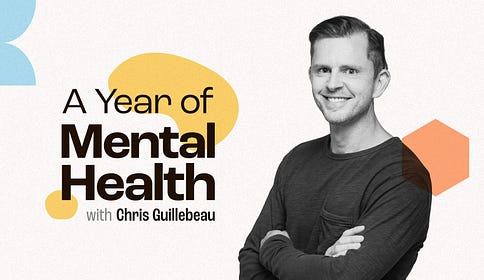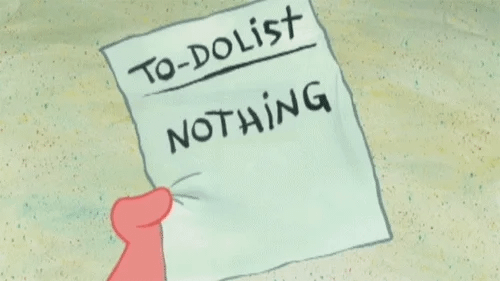Thanks for reading A Year of Mental Health! If you're enjoying it, consider supporting the project by upgrading your subscription. Comments on back on today’s post, so feel free to chime in if you’d like. 🎈
I left out a few things on the post about unhelpful life advice. Here’s one more: “Stop being lazy.” This one is a little different from the other things. With “stop being lazy” (or “don’t be lazy,” or another variation), most of the time, no one else is saying it to us—WE are saying it to ourselves. Yet it’s just as unhelpful as telling someone they should “avoid distractions” and “focus more”! In fact, I have a strong opinion: not only is this advice unhelpful, it’s also untrue. Breaking news: YOU’RE NOT LAZY. How can I be so confident? First, because you’re reading a post about self-improvement, i.e. making your life better. Most likely, you’ve read one of my books or other posts or something else I’ve written. Even if not, you probably followed a link from someone else who shares on these topics. The point is, you’re somewhat interested. You don’t have to do this. You could waste time like everyone else does. But you are deliberately choosing to engage with posts and stories about being better this year than the last. Maybe you even identify with the description of my ideal reader:
Second, chances are, you have behaviors that might present as laziness, but underneath the surface, something else is going on. Instead of being lazy, you struggle with executive functions (initiating tasks, planning, remembering things, etc.), not motivation. You might be able to hyperfocus on some tasks, which is great—but it also leaves you feeling very tired and unable to tackle what seem like simple or easy tasks. This has nothing to do with being lazy. In fact, you could think of it like this: For someone who’s lazy, you’re often working really hard! This is especially common for those of us with ADHD, but we don’t have the behavior entirely to ourselves. So this is what it comes down to: you want to do better—but it’s sometimes a struggle. And if you don’t learn how to manage this dynamic, you’ll never improve. So that’s what we need to work on! You’re not lazy, so the solution isn’t “just work harder.” You need to work differently and from a new perspective. You need to learn new skills. FACT #1: Laziness can be a form of learned helplessness.At some point, you learned to be lazy (let’s just use the word for now, even though it’s not quite right) because you feel afraid or powerless. In other words, laziness is a recognized sense of futility. It comes from a lack of agency, where you feel like nothing you do will matter. You can’t change circumstances, so why try? Laziness can also be known as “output failure”: the inability to produce results or take action despite having the desire or intention to do so.¹ FACT #2: Shame does not create change.No one is shamed into effective change. So what is effective? It starts with a change in motivation and a commitment to be better. Consider, without guilt, how YOU hold yourself back. Can you think of a specific circumstance? Your self-compassion is not only an acknowledgement. It can help you move away from the things that are harming you.² To be clear, I am not an expert in this matter. I too am learning it along the way. But understanding that you probably aren’t lazy, and that this pattern of behavior is a logical response to your environment, is a good start. — Conversation Starters
1 See: https://www.simonandschuster.com/books/The-Myth-of-Laziness/Mel-Levine/9780743213684 And also: “The Conception of Laziness and the Characterisation of Others as Lazy,” https://link.springer.com/article/10.1007/s42087-018-0018-6 2 We’ll discuss this more in a future post. You’re currently a free subscriber to 🌻 A Year of Mental Health. For the full experience, consider upgrading! |
Monday, June 10, 2024
The Myth of Laziness
Subscribe to:
Post Comments (Atom)
-
insidecroydon posted: " Become a Patron! What's on inside Croydon: Click here for the latest events listing...




No comments:
Post a Comment